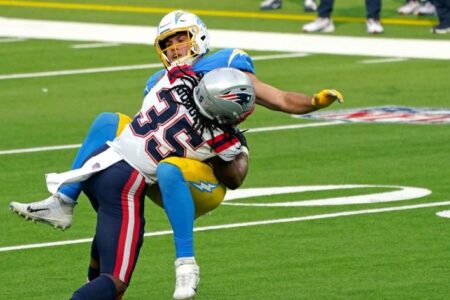captain stone
PatsFans.com Retired Jersey Club
- Joined
- Sep 29, 2004
- Messages
- 34,247
- Reaction score
- 27,531
Registered Members experience this forum ad and noise-free.
CLICK HERE to Register for a free account and login for a smoother ad-free experience. It's easy, and only takes a few moments.Well, one problem was the equation of science with reason, which you seem to be teasing out here. The two aren't synonyms except perhaps to the vulgar empiricist like Hume or Bentham who equates science with fact. Hobbes' Continental contemporaries like Spinoza (my personal favorite philosopher, who was influenced by Hobbes) or Descartes, to the idealists like Kant and Hegel, and to post-Enlightenment philosophers such as Kuhn and Wittgenstein all have pretty different views on what underlies reason. Kant's most famous work, of course, is A Critique of Pure Reason.
The fault with Hobbes here lies with imagining reason to go all the way down; belief and reason are not two separate poles. Below reason there's belief. Hobbes even mentions this, but he fails to take it to a final analysis. As you say, look at any scientific study, and there's a hefty amount of assumptions and values underlying it -- they're just given names like assumptions and premises. One can argue the premises, as (to take it back to the topic) we saw with picking apart the facts in the Wells Report. But when there's two facts, which ones are real? This all comes down to belief.
One major tenet of post-Enlightenment ontology is that there's no such thing as objective fact, as every subject experiences reality as an object quite differently. The conceit of western juridical systems, based as they are on Enlightenment-era thinking, particularly Benthamite, is that you're presenting fact, but really it's about crafting a particular narrative of reality. Whomever presents the more coherent narrative of reality, and whose narrative aligns with the judge's moral and ethical values, will win. Reason can only take you so far. Moral appeals and language-games which fall under Hobbesian definitions of "opinion" are hugely important.
Can't remember who I read (Hampshire/Hobbes?) but I think it's somewhat deflategate related:
I'll paraphrase: ' The pen is mightier than the sword but you better have the sword'
I had never come across the phrase vulgar empiricist, but I quite like it. I am one myself!Well, one problem was the equation of science with reason, which you seem to be teasing out here. The two aren't synonyms except perhaps to the vulgar empiricist like Hume or Bentham who equates science with fact.
I really did not like or approve of Kant/Hegel - to me they are the source of moral relativism and the kind of BS that underlies the NFL smear/PR campaign. Not to mention Nazi philosophy. To make your point, I don't necessarily agree with their basic assumptions, although their reasoning is sound.Hobbes' Continental contemporaries like Spinoza (my personal favorite philosopher, who was influenced by Hobbes) or Descartes, to the idealists like Kant and Hegel, and to post-Enlightenment philosophers such as Kuhn and Wittgenstein all have pretty different views on what underlies reason. Kant's most famous work, of course, is A Critique of Pure Reason.
True, so long as we exist in Plato's cave. However, sometimes it may be due to lack of adequate perspective as in Edwin Abbot's Flatland.The fault with Hobbes here lies with imagining reason to go all the way down; belief and reason are not two separate poles. Below reason there's belief. Hobbes even mentions this, but he fails to take it to a final analysis. As you say, look at any scientific study, and there's a hefty amount of assumptions and values underlying it -- they're just given names like assumptions and premises. One can argue the premises, as (to take it back to the topic) we saw with picking apart the facts in the Wells Report. But when there's two facts, which ones are real? This all comes down to belief.
It is my belief that science and reason most closely articulate an objective reality and that departures from that, no matter how well intentioned or well argued are essentially deceptions, which manifest themselves in this world as opinions.One major tenet of post-Enlightenment ontology is that there's no such thing as objective fact, as every subject experiences reality as an object quite differently. The conceit of western juridical systems, based as they are on Enlightenment-era thinking, particularly Benthamite, is that you're presenting fact, but really it's about crafting a particular narrative of reality. Whomever presents the more coherent narrative of reality, and whose narrative aligns with the judge's moral and ethical values, will win. Reason can only take you so far. Moral appeals and language-games which fall under Hobbesian definitions of "opinion" are hugely important.
If a settlement isn't reached, Berman said he'll rule on #deflategate before Sept. 4.
Since I don't expect a settlement to be reached, I look forward to Berman's ruling. Then it's off to the Court of Appeals.
I had never come across the phrase vulgar empiricist, but I quite like it. I am one myself!
I really did not like or approve of Kant/Hegel - to me they are the source of moral relativism and the kind of BS that underlies the NFL smear/PR campaign. Not to mention Nazi philosophy. To make your point, I don't necessarily agree with their basic assumptions, although their reasoning is sound.
True, so long as we exist in Plato's cave. However, sometimes it may be due to lack of adequate perspective as in Edwin Abbot's Flatland.
It is my belief that science and reason most closely articulate an objective reality and that departures from that, no matter how well intentioned or well argued are essentially deceptions, which manifest themselves in this world as opinions.
I know, because once they concede on the science explaining it, they say something brilliant like, "so why did he destroy his phone? Gotcha!"
How can you argue that logic?
<insert Captain Picard face palm here>
Already smacked down a Pats-hater today who trotted out that same banality. BOOM! ROADHOUSE!
...I'll paraphrase: ' The pen is mightier than the sword but you better have the sword'...














